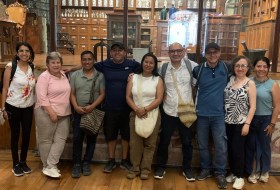News
Significant Contributions from Unicaucan Scholars to the Reflection on the Persistence of Pre-Hispanic Life in Mexico
From May 3rd to 10th, students and professors from the Doctorate in Ethnobiology and Biocultural Studies of our Alma Mater visited the Universidad Veracruzana. During this time, they conducted various activities to strengthen research and training processes in the field of Ethnobiology, as well as to foster significant academic exchange between both countries.
Professors and students from the VII cohort of the Doctorate in Ethnobiology and Biocultural Studies from our institution participated in the III Academic Exchange with the Graduate Program of the Tropical Research Center (CITRO) and the Center for Eco-Literacy and Dialogue of Knowledge at the Universidad Veracruzana in Mexico. This event featured various activities aimed at strengthening research and training processes in the field of ethnobiology. Among these activities were discussions with experts such as Abigail Aguilar Contreras, a renowned ethnobotanist specializing in Mexican herbalism; Jesús Miguel Flores Hidalgo, an ethnobotanist specializing in medicinal plants; Victoriano Hernández Martínez, head of the Departmental Unit of Traditional Medicine at SEPI - Mexico; and Gloria Figueroa, who works with indigenous women in governance systems.
According to Professor Lorena Alvear Narváez from the Department of Biology, the dialogues led to very important reflections on the persistence of essential elements of the life of pre-Hispanic peoples, including their practices, spirituality, and knowledge, while also addressing the biocultural diversity present in Mexico. "It is a quest to approach a historical perspective on the use of medicinal plants from pre-Hispanic times to the present, as well as how they circulated through commercial systems and the infrastructure established during different eras that have shaped the transformations of the landscape in what was once the center of the Mexica territory," said Professor Alvear.

Provided photo
Similarly, the articulation between academia and the ways of constructing indigenous knowledge, as well as human rights concerning ancestral territory and lineage that grants individuals legitimacy as members of indigenous communities with recognized knowledge, practices, and spirituality, was analyzed. This is essential for establishing genuine intercultural dialogues.
It is also important to mention that within the framework of the interinstitutional agreement and the academic exchange, the III Binational Mexico-Colombia Colloquium on Biocultural Methodologies and Experience Exchange took place in Xalapa, Mexico. The objective of this event was to reflect on the methodologies in research processes conducted by students and professors from the Universidad Veracruzana – CITRO, the Centro Ecodiálogos, and the Universidad del Cauca, in relation to Biocultural and Transdisciplinary Studies.

Provided photo
At this event, eight presentations were given with the participation of faculty and students from the Doctorate in Ethnobiology and Biocultural Studies of our university. “The recognition of experiences related to agroecology in coffee systems and the biocultural routes of the Veracruz archaeological sites concluded processes of acknowledging the current peoples and their socio-environmental life strategies,” concluded Professor Lorena.
From our university, committed to academic excellence, we highlight the valuable opportunity that the representatives of the Doctorate in Ethnobiology and Biocultural Studies had in actively engaging in various academic spaces in Mexico. Without a doubt, the mobility of our university community always represents a highly enriching and transformative experience: the exchange of perspectives, knowledge, and insights not only strengthens ties between institutions but also broadens academic horizons and perspectives for those who have this opportunity.

Finally, news like this allows us to reiterate our invitation to explore the various interinstitutional agreements and alliances offered by the Academic Vice-Rector's Office of our Alma Mater.
For more information:
Doctorate in Ethnobiology and Biocultural Studies
Email: detnobiologia@unicauca.edu.co


